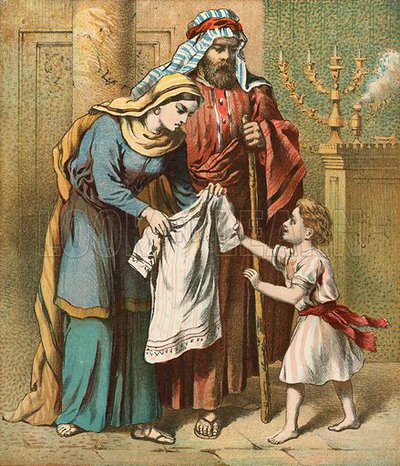Thoughts for the Day
Wednesday, 3rd July 2024: Samuel: 3
High Priest Eli 1 Samuel 2 Samuel Prophet
Reading : Verses from 1 Samuel, Chapter 2

Now the sons of Eli were scoundrels; they had no regard for the Lord or for the duties of the priests to the people. When anyone offered sacrifice, the priest’s servant would come, while the meat was boiling, with a three-pronged fork in his hand, and he would thrust it into the pan, or kettle, or cauldron, or pot; all that the fork brought up the priest would take for himself. This is what they did at Shiloh to all the Israelites who came there..... Thus the sin of the young men was very great in the sight of the Lord; for they treated the offerings of the Lord with contempt.
Samuel was ministering before the Lord, a boy wearing a linen ephod. His mother used to make for him a little robe and take it to him each year, when she went up with her husband to offer the yearly sacrifice. Then Eli would bless Elkanah and his wife, and say, ‘May the Lord repay you with children by this woman for the gift that she made to the Lord’; and then they would return to their home. And the Lord took note of Hannah; she conceived and bore three sons and two daughters. And the boy Samuel grew up in the presence of the Lord.
Now Eli was very old. He heard all that his sons were doing to all Israel, and how they lay with the women who served at the entrance to the tent of meeting. He said to them, ‘Why do you do such things? For I hear of your evil dealings from all these people. No, my sons; it is not a good report that I hear the people of the Lord spreading abroad. If one person sins against another, someone can intercede for the sinner with the Lord; but if someone sins against the Lord, who can make intercession?’ But they would not listen to the voice of their father..
Now the boy Samuel continued to grow both in stature and in favour with the Lord and with the people.
(Lectionary, New Revised Standard Version)
Thoughts
We usually jump in our reading of Samuel straight into the time when the boy is called by God, but today we continue with the story of Eli's sons. The Hebrew text calls them 'the sons of Belial' - a pagan god - thus indicating their utter wickedness. Yet these two men were priests and one would have succeed as high priest. When the people came to make a sacrifice to God it was the custom that a portion of it was given first to God, then to the priest, and finally to the person who brought the offering, but Eli's son would steal what was offered to God, and take it by force if necessary. This might seem of little importance to us (though news of their sexual activities was worse) but they were breaking the Law of Moses, and their greed and intimidation would have stopped people coming to worship God.
But what this story does is to highlight the purity and service of Samuel and to some extent of the high priest Eli himself, in comparison to the two evil priests. From the beginning the boy has served the Lord in the temple, and been given a simple linen ephod to wear. We're not exactly sure but an 'ephod' seems to have been some kind of ornate item worn by priests when carrying out their sacramental duties in the temple, as we can see from the description of the first high priest's clothing 400 years earlier (Exodus 39.1-7). From an early age Samuel was obeying God's purity laws. If Eli's sons were not worthy successors then God would raise up someone else.
Over the years we have heard of church leaders who were corrupt, and it always shocks and saddens us, but ultimately whatever their actions they do not hinder or stop God's work. For good women and men will hear and respond to God's call to carry out His mission to the world and to His Church. We are called to constantly remember such servants of God in our prayers.
Prayer
Lord Jesus Christ,
we pray for all who serve You in Your Church
in whatever way that might be,
giving thanks for their faithful
and dedicated service.
May they constantly listen to You
and trust in Your word,
for their ministry and their life.
We pray especially this day for:
....................................................................
asking that You will inspire them,
and protect them from all harm.
Amen.
You might like to read the full description of the sacred vestments that God had ordered Moses to have made for His priest Aaron, and for his sons:
This article looks at Aaron and his link to John the Baptist and thus to Jesus: